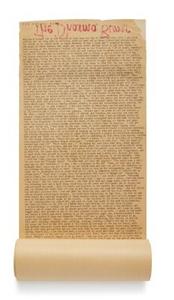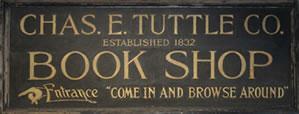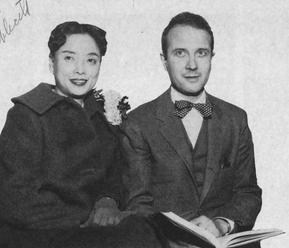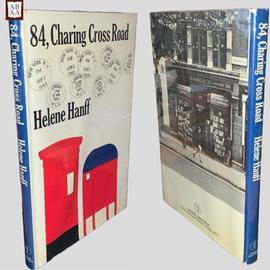
|
|
| Kerouac's The Dharma Bums scroll (c. Sotheby's) |
|
I don't romanticize the new book business, but I think I do romanticize the antiquarian book trade, largely because I know so little about it. I often check in with Fine Books & Collections, and am always intrigued by offerings like Jack Kerouac's original typescript scroll manuscript of The Dharma Bums or the late Rolling Stones drummer Charlie Watts's library of modern first edition books. As a collector, I'm more of a virtual window shopper.
I was reminded of my bookish deficiency when I read a Fine Books & Collections piece by Susan Benne, executive director of the Antiquarian Booksellers' Association of America. To commemorate its 75th anniversary, the ABAA will be offering a series of special events tied to its annual fairs throughout 2024. "This milestone year marks a significant evolution of the organization, characterized by a shift in the diversity of its leadership and membership and the material it promotes," Benne wrote. "Notably, there has been an increase in women business owners within the ABAA ranks, reflecting the organization's ongoing commitment to fostering diversity and growth....
"As we enter our 75th year, we continue to adapt and innovate, embrace new forms of material, and expand our reach to serve an evolving community of collectors and enthusiasts. With a rich history and forward-looking approach, the ABAA remains at the forefront of the trade, poised to shape its future for generations to come."
The ABAA began in 1949 with around 50 members, with most, unsurprisingly, being white men. Last week the San Francisco Standard reported that "the association looks a lot different than it did in the beginning.... The approximately 400 members represented at this year's California International Antiquarian Book Fair last weekend include many women-owned businesses, with offerings stretching far beyond rare books."
"It's moved from a gentleman's pursuit to a pursuit for everybody," said Benne.
This is all great news. Congratulations on your anniversary year, ABAA. I wish more than ever that I was a collector of rare and antiquarian books, but even the many signed first editions scattered throughout my bookcases are more a reflection of years spent as an indie bookseller marketing new titles than an acquirer of collectible editions.
If my personal library could talk, it would say, "What's the plan here, man? What's the long-term vision?" To which I'd have to reply, "No plan, my friends; and it's too late for a long-term vision. Just be happy you're shelved, warm and dry." Or maybe I've just been "building an accidental book collection."
 What's odd about this is that when I was a young man (1970s-1980s vintage), the bookshop that meant the most to me in the world was Tuttle Antiquarian Books in Rutland, Vt. In fact, one of the first columns I ever wrote for Shelf Awareness was about the closing of the bookstore in 2006 after 174 years in business. I still mourn its passing.
What's odd about this is that when I was a young man (1970s-1980s vintage), the bookshop that meant the most to me in the world was Tuttle Antiquarian Books in Rutland, Vt. In fact, one of the first columns I ever wrote for Shelf Awareness was about the closing of the bookstore in 2006 after 174 years in business. I still mourn its passing.
As I mentioned in that long ago column, I lived in Rutland from 1973 until 1997, so I knew the bookshop well. I loved being left alone to explore room upon musty room of book-laden shelves, and I will be in their debt forever because I discovered the wonders of Asian literature and art in that quaint bookshop.

|
|
| Reiko and Charles Tuttle | |
Charles Tuttle, who died in 1993, was serving as an American soldier in Tokyo after World War II when he fell in love with Japanese culture. He made it his life's mission to introduce this world to American readers. In addition to their extensive used book inventory, Tuttle Antiquarian Books displayed and sold an array of new titles from Tuttle Publishing, which still thrives.
One of many books I bought new there was Zen Art for Meditation by Stewart Holmes and Chimyo Horioka (1973). It is still in print as a paperback, but I have a first edition hardcover. Yes, it's one of those collectibles hiding on my shelves.
For years, I thought the reason there were so few customers in Tuttle Antiquarian Books must be because their business was conducted primarily through mail order. I imagined them nurturing worldwide customer relationships--the 84, Charing Cross Road effect.
Speaking of which, my romanticizing of antiquarian booksellers also owes no small debt to Helene Hanff. In a letter dated October 5, 1949, she responded to an advertisement placed by London's Marks & Co. bookshop in the Saturday Review of Literature. Noting that the phrase "antiquarian bookseller" had prompted fear the shop's wares might be too expensive, she wrote: "I am a poor writer with an antiquarian taste in books and all the things I want are impossible to get over here except in very expensive rare editions, or in Barnes & Noble's grimy, marked-up schoolboy copies."
Thus began a legendary correspondence, over the course of two decades, between Hanff and bookseller Frank Doel of Marks & Co., as well as his colleagues and family. The letters would eventually be collected in the epistolary novel 84, Charing Cross Road (1970).
 As fate would have it, a U.K. first edition popped up on ABAA's Facebook page last week: "Fine condition with only slight rubbing to the boards and faint foxing to the page edges; housed in a crisp and clean near fine dust jacket that shows only light rubbing to the spine ends and edges, and a very mild general age-toning, else Fine."
As fate would have it, a U.K. first edition popped up on ABAA's Facebook page last week: "Fine condition with only slight rubbing to the boards and faint foxing to the page edges; housed in a crisp and clean near fine dust jacket that shows only light rubbing to the spine ends and edges, and a very mild general age-toning, else Fine."
If only I, neither rare nor collectible, had weathered the decades as well.

